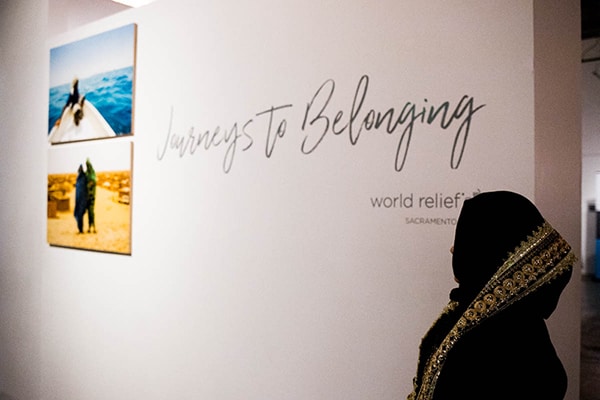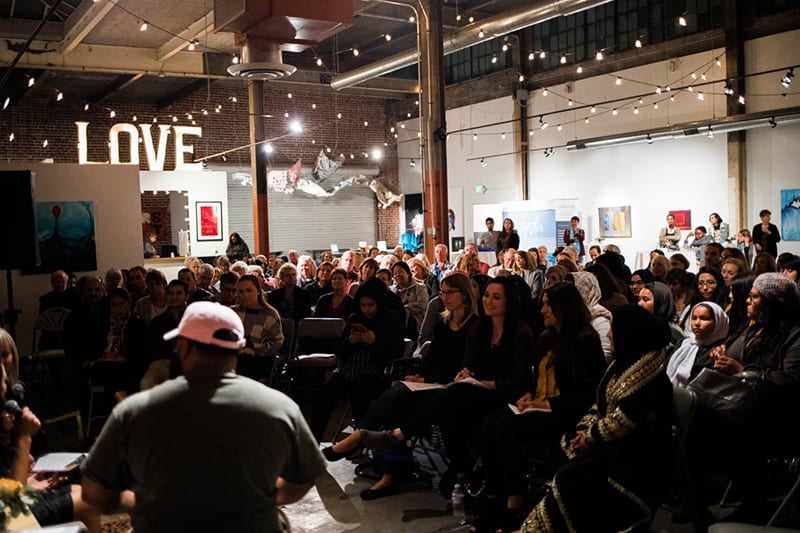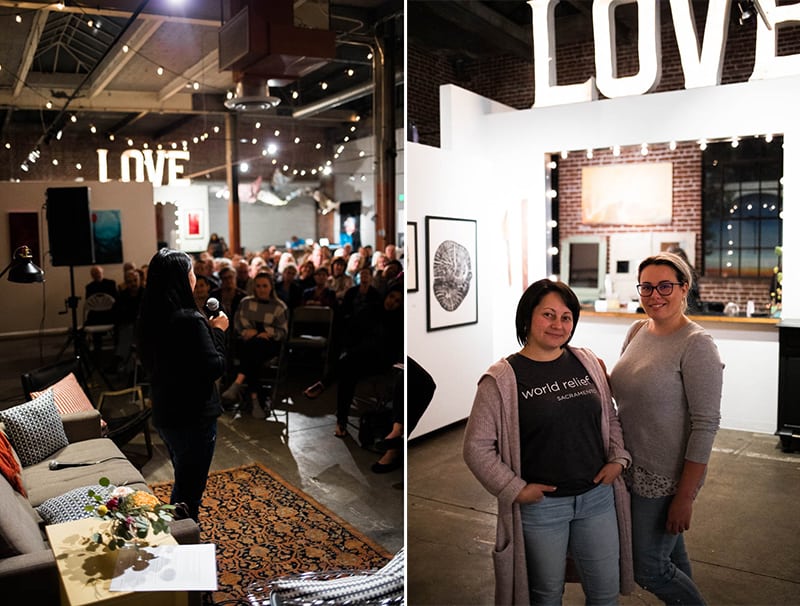This month we hosted our first storytelling night, “Journeys to Belonging,” at Beatnik Studios in downtown Sacramento. Over 200 attendees came to hear stories from refugee and immigrant women, as well as World Relief staff members highlighting different aspects of what it means to belong and feel connected to your new home. DeVon, Wade, World Relief’s Church Mobilizer, stated the fact that “when you know someone’s story, they move from being a stranger to becoming your neighbor.”

The night’s first speaker, Svitlana, came as a refugee from Ukraine. She and her husband wanted to raise their family in a safer place, one where there would be no threat of mandatory military service. She was expecting twins and was barely halfway through her pregnancy. Shortly after arriving in Sacramento, she went to the hospital for a checkup, and the doctor informed her that in a matter of minutes her first child would be born. At twenty seven weeks, she gave birth to her son and daughter. Her son needed an oxygen mask to breathe, and her daughter’s heartbeat was irregular. Svitlana’s World Relief caseworker asked what her family needed. They asked if World Relief could bring them food. They were spending as much time as they could at the hospital, going home only to shower, change clothes, and maybe get a few hours of sleep.
Svitlana expected World Relief volunteers to come, drop off food, and leave. She did not expect them to stay, to hold her children, to ask the doctors and nurses questions on their behalf. She did not expect to form friendships. Prior to coming to the United States, she thought of Americans as people who smiled and said, “How are you?” without meaning it. She no longer holds to that assumption and now describes Americans as genuine people. She concluded her story by inviting her husband and their two children to the stage, who were received with enthusiastic applause. At their last checkup, the doctors could not believe they had been born premature. Like the audience, all they saw were happy and active toddlers.

For the second storyteller, Irina, belonging had always been somewhat illusive. Born in Uzbekistan but having spent most of her life in Ukraine, she was ostracised. In her words, she was often “the only Asian girl in [her] class” and her family was protestant in an orthodox country. She and her husband, Paul, spent the first two years of their marriage in China, his home country. Because he was a Bible teacher, the government frequently threatened to revoke Irina’s visa. They tried returning to Ukraine, but when they refused to pay a bribe to the government, Paul’s visa was denied. So, they decided to seek asylum in the United States. Passports stacked on top of one another, they held hands and walked to the US-Mexico border. They were sent to detention centers on opposite ends of the country—Irina to Bakersfield,CA, and Paul to Georgia.
Of her detention experience Irina says, “I wouldn’t wish it on my worst enemy.” Even as she reflected on the experience, she told the audience about others who in her mind, however, had made more difficult journeys. Like the women from Eretria who started as group of four but were only three, their friend drowning while trying to cross a river. After four months, she won her case and came to Sacramento. Paul joined her a month later. Having spent most of their money on legal fees, they felt discouraged. A friend suggested they reach out to World Relief Sacramento for assistance. Irina was skeptical: “Why would they help me? I chose to leave Ukraine.” Nevertheless, she took her friend’s advice, and she and Paul received help with housing, employment, and transportation. This year they welcomed their first child, and Irina told the audience she was excited to raise her family in America. As a former client, she still feels connected to our office, maintaining friendships with staff. For her, Sacramento feels like home.

For Irina, making it to Sacramento was the start of her journey to belonging. Kobra, the night’s final storyteller, had hoped for the same. She thought that in America she would be a stronger, more independent woman. Growing up in Afghanistan, she had attended school for only four years before the Taliban banned girls from pursuing education. She liked school and had dreams of becoming a reporter. A few years ago, when she came to America, she enrolled in ESL classes. She wanted to learn the language, understand transportation systems and not be so dependent on her friends and neighbors who she felt had no time for her. The ESL classes, however, were not as helpful as she had hoped. The students were at different levels, most far more advanced than her, and when she asked questions, she was met with unkind, impatient remarks. She felt even more isolated and hopeless.
One of her friends had been attending World Relief’s ESL and activities classes. These were being (and continue to be) held at Kobra’s complex, and they are designed specifically for Afghan refugee women who have not learned to read or write in their native languages. The first few classes, Kobra said, she wasn’t sure what to think. Now, she wishes they were offered more than twice a week. She feels confident. The classes are good for her both “mentally and spiritually.” Kobra talked about practicing English with her husband and how she’d learned the difference between “love” and “like.” She flashed the audience a big smile as she said, “I love my husband. I like my mother-in-law.” The crowd laughed and cheered.
The number of refugees and displaced people is at an all time high. Now, more than, ever we want to hear refugee and immigrant voices. We are incredibly grateful for Svitlana, Irina and Kobra’s stories. Over the past three years, our region has welcomed more refugees than anywhere in the nation. Even as the number of refugees being admitted into the US decreases, our organizational mission does not change. The ingredients to making a new place home goes beyond the initial welcome and settling in process. We are committed to providing programs and services like employment and ESL classes that focus on integration and address barriers to belonging.
We are thankful for the staff who introduced each of our storytellers, to event volunteers who set up chairs and transformed a blank space into an intimate stage area that resembled a living room. We are grateful Society Church for providing AV and sound assistance, as well as our caterer, FreshMed, and the women from our refugee women’s classes who baked Afghan cookies for dessert. We look forward to hosting future social events like Journeys to Belonging where strangers become neighbors and friends become family.
